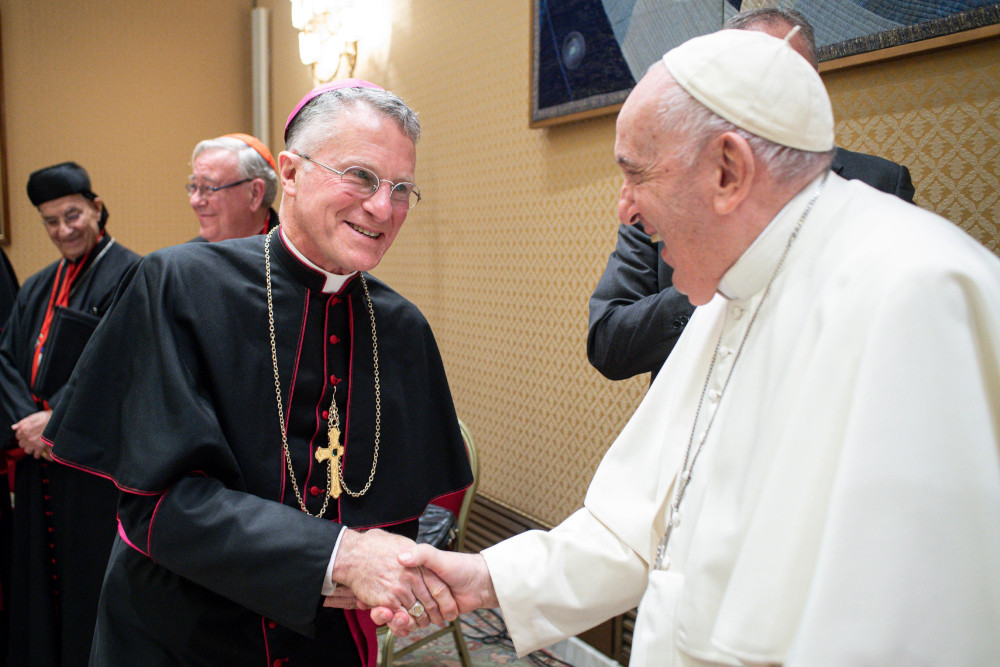Last month, the United States Conference of Catholic Bishops met in Baltimore, as they do every November, for their annual plenary. As they do every three years, they elected a new president – this time, Archbishop Timothy Broglio of the Archdiocese for Military Services, replacing the outgoing president, Archbishop José Gómez of Los Angeles.
The election produced an eruption of hysteria from some of the usual suspects in Catholic media who claimed the vote was a “repudiation” of Pope Francis or a vote for “post-episcopal Catholicism.” The arguments, such as they were, were largely specious and partisan, not worth rebutting here.
What is worth challenging is the disproportionate importance that has been increasingly attributed in recent years to elections for conference leadership and even to the episcopal conference itself.
The bishops’ conference exists primarily to assist the bishops in their ministry. Much if not most of the work done at the USCCB is conducted by (largely lay) staff. Which means that the president of the conference is primarily an administrative, not pastoral, role. Though it’s true that the conference president can shape (though not dictate) the work and priorities of the conference and that he represents the Church in the United States in Rome.
But the USCCB is emphatically not the headquarters of the Catholic Church in the United States. The USCCB is not the governing body of American Catholicism (though the bishops assembled do have some limited capacity to create particular law.) The president of the conference is neither the patriarch of the United States nor the chief pastor of the American Church.
None of this is to say the conference or its leadership are not important. They are. But they are mostly important as aids to the bishops. They exist to assist bishops in their ministry, not to replace them.
From the very beginning of his pontificate, Pope Francis has, in various ways, emphasized and elevated the role of national and regional episcopal conferences. This emphasis on episcopal conferences is not without warrant.
First, and most importantly, the Second Vatican Council, particularly in Lumen Gentium and Christus Dominus, focuses on the ministry of bishops and the principle of collegiality. Bishops are not branch managers within Catholicism’s corporate structure, nor are they mere deputies of papal authority. Bishops possess legitimate authority of their own.

When acting as a college, always cum Petro et sub Petro (“with and under Peter”), this authority finds its fullest expression. Hence the tremendous weight given to ecumenical councils. This understanding of episcopal authority has roots much deeper than Vatican II, going back to the very earliest centuries of the Church.
In Evangelii Gaudium, Pope Francis wrote that the Second Vatican Council’s hopes for episcopal conferences had not yet been fully realized since, as he put it, “a juridical status of episcopal conferences which would see them as subjects of specific attributions, including genuine doctrinal authority, has not yet been sufficiently elaborated.” The result, according to Francis, has been over-centralization and undue reliance on Rome. “Excessive centralization, rather than proving helpful, complicates the Church’s life and her missionary outreach.”
Some of his eagerness to bolster the authority of episcopal conferences, no doubt, stems from Pope Francis’ long experience as president of the Argentine Episcopal Conference and most especially his experience at the meeting of the Latin American Episcopal Conference (CELAM) at Aparecida in 2007.
This affinity for “healthy decentralization,” as Pope Francis sometimes calls it, clearly shapes his understanding of synodality – including, it seems, his willingness to give tremendous leeway to careening experiments in ecclesiology, pastoral practice, and sacramental discipline like those underway in Germany.
But for all the emphasis on decentralization, this pontificate has also been marked by some unusually heavy-handed centralizing moves. The implementation of Traditiones Custodes, for example, substantially curtailed the ability of individual bishops to regulate liturgical matters within their own dioceses (particularly with regard to the Traditional Latin Mass), even going so far as to dictate what Mass times could be published in parish bulletins.
Pope Francis has also promulgated far more legislation than any of his recent predecessors. That legislation, in turn, has been implemented and enforced in a somewhat irregular and inconsistent manner (e.g., Vos estis lux mundi’s rules on handling sex abuse). As often as not, Pope Francis’ governance style has had the opposite effect of his stated intention: centralizing authority in Rome, diminishing the authority of individual bishops, and making the person of the pope (rather than ecclesial law or magisterial teaching) the primary reference point of Catholic life.
Which brings us to a recent interview with America, in which Pope Francis made some refreshingly straightforward, and helpfully clarifying, statements about the importance of the pastoral authority of bishops relative to episcopal conferences:
I think it is misleading to speak of the relationship between Catholics and the bishops’ conference. The bishops’ conference is not the pastor; the pastor is the bishop. So one runs the risk of diminishing the authority of the bishop when you look only to the bishops’ conference. The bishops’ conference is there to bring together the bishops, to work together, to discuss issues, to make pastoral plans. But each bishop is a pastor. Let us not dissolve the power of the bishop by reducing it to the power of the bishops’ conference. Because at that level, these tendencies compete, more on the right, more on the left, more here, more there, and anyway [the bishops’ conference] does not have the flesh-and-blood responsibility like that of a bishop with his people, a pastor with his people.
The pope’s words can be read as a corrective to those who would treat episcopal conferences, rather than bishops themselves, as the primary locus of episcopal authority in the Church. If the “healthy decentralization” Pope Francis desires is to produce unity, rather than chronic division, it will depend less on the leadership of this or that episcopal conference than on the leadership of the one bishop – the bishop of Rome – who is actually first among the brethren.
*Image: The Pope greets USCCB President Broglio at the meeting of heads of the regional assemblies of the Synod of Bishops, Monday 11/28/22. (CNS photo/Vatican Media)
You may also enjoy some of our most popular columns from the last dozen years:
Elizabeth A. Mitchell’s The Dubia Were Answered
Randall Smith’s Penance, Absolution, and Forgiveness of Sins

















